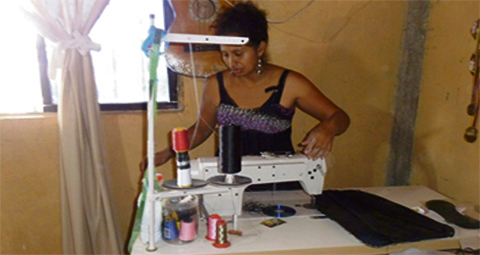April 17 | ![]() 0 COMMENTS
0 COMMENTS ![]() print
print

Small is more beautiful
Scottish priest FR COLIN MacINNES, a missionary living and working in Guayaquil, Ecuador, explains how tall oaks grow from small acorns by drawing our attention to a micro-credit project he helped to set up among parishioners
‘Big is beautiful’ was at one time a favourite slogan with government and industry but it is now quite a number of years since this slogan has been discredited. I remember as a priest in Barra we tried to popularise a contrasting slogan, ‘small is more beautiful,’ but I am not aware of the message reaching the high echelons of government or of industry. At the same time, we are all aware of how the world has been dehumanised by huge industrial conglomerates, international banking, ambitious governmental designs and ideologies which have led to the the globalisation of greed leaving the ordinary man a bystander as the few reap incredible financial rewards at the expense of great majorities. It is calculated that Bill Gates—one of the more exemplary billionaires—would have to live for over 200 years to be able to spend his fortune even though he spent $1,000,000 every day. Quite a staggering thought.
Working in the slums or shanty towns of Latin America makes you realise that every person has ambitions of betterment. These ambitions might be small and limited at first. As a starting point it could be the desire to cover the whole roof of the bamboo hut—which has just been constructed —with zinc sheets so that less water comes through. Rain water converts the earth floor into a muddy swamp. Then an extension has to be considered so that the bed, toilet, stove and kitchen table can be better separated giving way to a more dignified existence; after this cement blocks replace the bamboo and, as the region is earthquake prone, building regulations demand that the cement pillars supporting the cement blocks are iron reinforced. Pillars are then made so as to support another few floors and so means are made for the family, as they grow up and marry, to have their own department. Water tanks and cesspits disappear as the municipal authorities install potable water and sewage systems. A new town is in the making.
I have seen this process developing before my very eyes in the Comité del Pueblo. The Comité del Pueblo, would—40 years ago—be regarded as the poorest and most violent shanty town in Ecuador. Today it is a well-developed working-class town with all the amenities of modern city living and a population of 150,000. It is hard to believe that when we first started to campaign for potable water the Municipal Authority of Quito told us that they had their plans to provide potable water—the year, 2020! I am proud of the parish I started there, which led the development and transformation of the Comité del Pueblo. The city of Quito and the National Government generously awarded us for our efforts.
Poor people are poor, not because they want to remain poor, not because they are lazy, not because they are incapable of bettering themselves, but because they are prevented from bettering their standard of living. The educational system in poor barrios is incredibly insufficient and simply bad. Health care is largely ignored, but there are also other underlying and more pernicious factors: small time caciques—self-elected quasi leaders—who by threats and promises delude the population; political parties have an interest in having extensive populations of poor people at their beck and call as a show of power, the banking system who do not trust poor people and exclude them from the possible benefits of a financial system.
Of all these factors financial hardship is central to all and so debilitating to people and communities. To blame the moral fibre of people would be a grave mistake. Within an urbanised context you cannot have a cup of water for your morning coffee without money. In the town, everything has be bought. It was the first hard lesson that so many who had left their rural settings had to learn; secondly that the neighbour could do little to help as poverty was shared and the lot of all; thirdly that hard labour did not bring hard cash as manual labourers were plentiful and wages were miserable—sueldos de miseria—was the biggest complaint of all.
As I observed and shared the hardships of the population I became more and more determined that I had to do something to change this situation. The male population was working long hours or spending long hours looking for work. The women folk were at home, had little or nothing to do or that they could do. They had no money, could not dress adequately for every day social occasions and suffered from a male dominated society—machismo. “I feel so useless,” was often the cry of the women. I needed capital and I did not have it so I started writing different foundations.
The Scottish Catholic International Aid Fund had turned down previous requests, but I heard of a young energetic and enterprising project worker, Chris MacLullich, that had joined the fund so I determined to test my luck. So many fund managers only think of possible problems and difficulties. Chris was more interested in exploring the potentialities of establishing a development fund and along with my niece, Louisa MacInnes, we designed a micro-credit project for which SCIAF provided capital of $12,000.
The project consisted of forming groups of 12 to 15 women. Once they explained how each one planned to use the money for establishing a small business, and once they received specific training on how best to establish their project, a loan was provided for each group. The group leader had to distribute $100 to each member. Each person had to start a process of saving $5 every month and it was the group responsibility to pay back the loan in monthly quotas. Each month they had to give a progress report to the group leader and to me and they had six months to pay back the total amount—plus the minimum interest. There were other rules and regulations that had to be observed if they were to receive a second loan. Second and further loans depended on an evaluation of their capability of using more money responsibly. They also had to start a solidarity fund within the group—$1 a week—so as to help members in difficulty or on occasions of domestic tragedies—house on fire; breadwinner out of work for an extended period and so on.
The first two years were very difficult and I did not have a professional person to help—professional people do not live in marginalised barrios—but with the passing of the months the women saw the value of having good team spirit, of working one for another, of saving for a rainy day, of prudence in their business and not expecting to get rich overnight.
Examples abound. Señora Piedad Contreras thought she had skills in making purses and small bags and so she bought needles, scissors and other materials and started ‘peddling her wares.’ Her group helped her. “It gives you a good feeling to lend a helping hand without expecting anything in return,” was the comment one made. Time brought success and she now has two workers helping her. She now wants to buy a sound system because there are so many parties for graduation, birthdays and family events and they like maximum noise at these celebrations. Señora Lady Chele invested in a course for hairdressing and now she has a reputable saloon and happy at her work. A large number of women have a catalogue trade, which is very popular, while others have started small ‘corner shops’—bazaars, buying in bulk cleansing materials and selling them in smaller bottles. The list is interminable. As the credit is only for those who have or want to start small businesses and now that there are 15 groups functioning you can imagine that the variety of enterprises is immense.
The system of micro-credit is now a worldwide phenomenon and Muhammad Yunus has won a Nobel Prize for his work in Bangladesh. It is heartening how the women grow in self-esteem; how much they learn about themselves and about life in working within a group where everyone is respected for who he or she is; to learn of their satisfaction in contributing to the family economy, improvements in the home and especially in helping their children have a better education.
This year almost all the groups had a Christmas party for all the poor children in their sector and each year every group is asked to carry out some social programme for the improvement of their area. They paint houses for the elderly, improve houses for the old and other works of charity. The emphais on working together helps them to think of the needs of others and be willing to help others. In the marginalised barrios there are always people in need.
I am pleased to write that the system is now consolidated. With the profits from the loans we have been able to construct new offices and establish Catechetical rooms for the parish children. We do not want to grow two big and we limit loans to $500 for each member. Money is a corrupting factor in every society and big money corrupts in a big way. That is what takes my mind back to Barra and say with conviction: small is more beautiful.’
— If anyone wishes to support Fr Colin MacInnes’ missionary effort, donations can be made out to Scottish Catholic Observer Charity Appeal, 19 Waterloo St, Glasgow, G2 6BT










